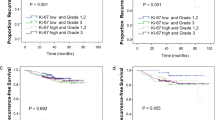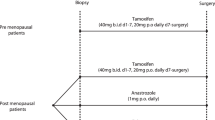Abstract
The expression of Ki67 in breast cancer has been associated with the luminal B phenotype, a high risk of relapse, and likelihood of good response to neoadjuvant chemotherapy. Several guidelines propose assays to determine Ki67 expression levels to select which patients with early stage breast cancer and 1–3 positive axillary nodes should not receive adjuvant chemotherapy. We discuss why oncologists should not rely on the use of this biomarker for patients with early stage breast cancer and only 1–3 positive axillary nodes. First, Ki67 staining lacks analytical validity. Second, the performance of the biomarker for prognostic purposes is poor, with no compelling evidence to indicate that patients with oestrogen receptor (ER)-positive disease, low Ki67 expression and 1–3 positive axillary nodes have a very low risk of disease relapse. Finally, no robust evidence indicates that Ki67 staining predicts the efficacy of adjuvant chemotherapy. Overall, evidence does not support withholding adjuvant chemotherapy in patients with ER-positive, Ki67-low breast cancer and 1–3 positive nodes without risk in daily practice.
This is a preview of subscription content, access via your institution
Access options
Subscribe to this journal
Receive 12 print issues and online access
$209.00 per year
only $17.42 per issue
Buy this article
- Purchase on Springer Link
- Instant access to full article PDF
Prices may be subject to local taxes which are calculated during checkout

Similar content being viewed by others
References
Early Breast Cancer Trialists' Collaborative Group (EBCTCG). Comparisons between different polychemotherapy regimens for early breast cancer: meta-analyses of long-term outcome 100,000 women in 123 randomised trials. Lancet 370, 432–444 (2012).
Perou, C. M. et al. Molecular portraits of human breast tumours. Nature 406, 747–752 (2012).
Sotiriou, C. et al. Breast cancer classification and prognosis based on gene expression profiles from a population-based study. Proc. Natl Acad. Sci. USA 100, 10393–10398 (2003).
Sotiriou, C. & Pusztai, L. Gene-expression signatures in breast cancer. N. Engl. J. Med. 360, 790–800 (2009).
Pathmanathan, N. & Balleine, R. L. Ki67 and proliferation in breast cancer. J. Clin. Pathol. 66, 512–516 (2013).
Cheang, M. C. et al. Ki-67 index, Her2 status, and prognosis of patients with luminal B breast cancer. J. Natl Cancer Inst. 101, 736–750 (2009).
de Azambuja, E. et al. Ki-67 as prognostic marker in early breast cancer: a meta-analysis of published studies involving 12,155 patients. Br. J. Cancer 96, 1504–1513 (2007).
Sueta, A. et al. Clinical significance of therapeutic Ki-67 as a predictive parameter for response to neoadjuvant chemotherapy in breast cancer: is it equally useful across tumour subtypes? Surgery 155, 923–935 (2014).
Ohno, S. et al. Randomized trial of preoperative docetaxel with or without capecitabine after 4 cycles of 5-fluorouracil-epirubicin-cyclophosphamide (FEC) in early-stage breast cancer: exploratory analyses identify Ki-67 as a predictive biomarker for response to neoadjuvant chemotherapy. Breast Cancer Res. Treat. 142, 69–80 (2013).
Goldhirsch, A. et al. Personalizing the treatment of women with early breast cancer: highlights of the St Gallen international expert consensus on the primary therapy of early breast cancer 2013. Ann. Oncol. 24, 2206–2223 (2013).
Senkus, E. et al. Primary breast cancer: ESMO clinical practice guidelines for diagnosis, treatment and follow-up. Ann. Oncol. 24 (Suppl. 6), vi7–vi23 (2013).
Albain, K. S. et al. Prognostic and predictive value of the 21-gene recurrence score assay in postmenopausal women with node-positive, oestrogen-receptor-positive breast cancer on chemotherapy: a retrospective analysis of a randomised trial. Lancet Oncol. 11, 55–65 (2010).
Dowsett, M. et al. Prediction of risk of distant recurrence using the 21-gene recurrence score in node-negative and node-positive postmenauposal patients with breast cancer treated with anastrozole or tamoxifen: a TransATAC study. J. Clin. Oncol. 28, 1829–1834 (2010).
US National Library of Medicine. ClinicalTrials.gov[online], (2015).
Evaluation of Genomic Applications in Practice and Prevention (EGAPP) Working Group. Recommendations from the EGAPP Working Group: can tumour gene expression profiling improve outcomes in patients with breast cancer? Genet. Med. 11, 66–73 (2009).
Polley, M. Y. et al. An international Ki-67 reproductibility study. J. Natl Cancer Inst. 105, 1897–1906 (2013).
Mikami, Y. et al. Interobserver concordance of Ki-67 labelling index in breast cancer: Japan Breast Cancer Research Group Ki-67 ring study. Cancer Sci. 104, 1539–1543 (2013).
Gudlaugsson, E. et al. Comparison of the effect of different techniques for measurement of Ki-67 proliferation on reproducibility and prognosis prediction accuracy in breast cancer. Histopathology 61, 1134–1144 (2012).
Varga, Z. et al. How reliable is Ki-67 immunohistochemistry in grade 2 breast carcinomas? A QA study of the Swiss Working Group of Breast- and Gynecopathologists. PLoS ONE 7, e37379 (2012).
Dowsett, M. et al. Assessment of ki67 in breast cancer: recommendations from the International Ki-67 in Breast Cancer Working Group. J. Natl Cancer Inst. 103, 1656–1664 (2011).
Penault-Llorca, F. et al. Interpathologists discrepancies in Ki-67 assessment in the PACS01 trial: an independent prognosis factor [abstract]. J. Clin. Oncol. 30 (Suppl.), a543 (2012).
Laurinavicius, A. et al. A methodology to ensure and improve accuracy of Ki-67 labelling index estimation by automated digital image analysis in breast cancer tissue. Breast Cancer Res. 16, R35 (2014).
Viale, G. et al. Prognostic and predictive value of centrally reviewed Ki-67 labelling index in postmenauposal women with endocrine-responsive breast cancer: results from Breast International Group trial 1–98 comparing adjuvant tamoxifen with letrozole. J. Clin. Oncol. 26, 5569–5575 (2008).
Cuzick, J. et al. Prognostic value of a combined oestrogen receptor, progesterone receptor, Ki-67, and human epidermal growth factor receptor 2 immunohistochemical score and comparison with the Genomic Health recurrence score in early breast cancer. J. Clin. Oncol. 29, 4273–4278 (2011).
Regan, M. M. et al. Re-evaluating adjuvant breast cancer trials: assessing hormone receptor status by immunohistochemical versus extraction assays. J. Natl Cancer Inst. 98, 1571–1581 (2006).
Filipits, M. et al. A new molecular predictor of distant recurrence in ER-positive, HER2-negative breast cancer adds independent information to conventional clinical risk factors. Clin. Cancer Res. 17, 6012–6020 (2011).
Adjuvant! Online. http://www.adjuvantonline.com/index.jsp (2015).
Paik, S. et al. Gene expression and benefit of chemotherapy in women with node-negative, oestrogen receptor-positive breast cancer. J. Clin. Oncol. 24, 3726–3734 (2006).
Bartlett, J. M. et al. Predictive markers of anthracycline benefit: a prospectively planned analysis of the UK National Epirubicin Adjuvant Trial (NEAT/BR9601). Lancet Oncol. 11, 266–274 (2010).
Penault-Llorca, F. et al. Ki-67 expression and docetaxel efficacy in patients with oestrogen receptor-positive breast cancer. J. Clin. Oncol. 27, 2809–2815 (2009).
Hugh, J. et al. Breast cancer subtypes and response to docetaxel in node-positive breast cancer: use of an immunohistochemical definition in the BCIRG 001 trial. J. Clin. Oncol. 27, 1168–1176 (2009).
Nitz, U. et al. Final analysis of the prospective WSG-AGO EC-Doc versus FEC phase III trial in intermediate-risk (pN1) early breast cancer: efficacy and predictive value of Ki-67 expression. Ann. Oncol. 25, 1551–1557 (2014).
Cortazar, P. et al., Pathological complete response and long-term clinical benefit in breast cancer: the CTNeoBC pooled analysis. Lancet 384, 164–172 (2014).
von Minckwitz, G. et al. Response-guided neoadjuvant chemotherapy for breast cancer. J. Clin. Oncol. 31, 3623–3630 (2013).
Dieci, M. V. et al. Prognostic value of tumour-infiltrating lymphocytes on residual disease after primary chemotherapy for triple-negative breast cancer: a retrospective multicentre study. Ann. Oncol. 25, 611–618 (2014).
Ellis, M. J. et al. Outcome prediction for oestrogen receptor-positive breast cancer based on postneoadjuvant endocrine therapy tumour characteristics. J. Natl Cancer Inst. 100, 1380–1388 (2008).
Ferlay, J. et al. Cancer incidence and mortality patterns in Europe: estimates for 40 countries in 2012. Eur. J. Cancer 49, 1374–1403 (2013).
US National Library of Medicine. ClinicalTrials.gov[online], (2015).
US National Library of Medicine. ClinicalTrials.gov[online], (2015).
US National Library of Medicine. ClinicalTrials.gov[online], (2013).
Author information
Authors and Affiliations
Contributions
All authors researched data for article, reviewed and edited the manuscript before submission, made a substantial contribution to discussion of content for the article, and wrote the manuscript.
Corresponding author
Ethics declarations
Competing interests
The authors declare no competing financial interests.
Rights and permissions
About this article
Cite this article
Andre, F., Arnedos, M., Goubar, A. et al. Ki67—no evidence for its use in node-positive breast cancer. Nat Rev Clin Oncol 12, 296–301 (2015). https://doi.org/10.1038/nrclinonc.2015.46
Published:
Issue Date:
DOI: https://doi.org/10.1038/nrclinonc.2015.46
This article is cited by
-
Prognostic value of Ki-67 index in primary intracranial tumors of infants
Child's Nervous System (2023)
-
qRT-PCR-based DNA homologous recombination-associated 4-gene score predicts pathologic complete response to platinum-based neoadjuvant chemotherapy in triple-negative breast cancer
Breast Cancer Research and Treatment (2022)
-
Deep learning models for histologic grading of breast cancer and association with disease prognosis
npj Breast Cancer (2022)
-
Generation of in situ CRISPR-mediated primary and metastatic cancer from monkey liver
Signal Transduction and Targeted Therapy (2021)
-
Effect of adjuvant chemotherapy in patients with ER + /HER2− breast cancer, assessed by propensity score matching: significance of nuclear grade and nodal status
Breast Cancer (2021)



